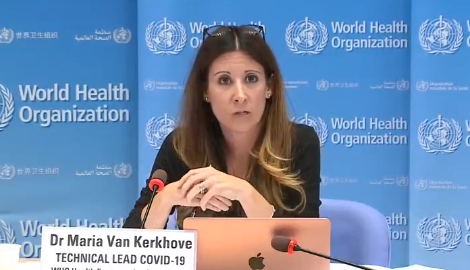NEW DELHI: The World Health Organisation, accused of playing partisan politics with the coronavirus, stumbled again last week when the technical head for coronavirus response told the media that “it still seems to be rare that an asymptomatic person actually transmits onward to a secondary individual.”
The medical fraternity was quick to react, rejecting her claim and Dr Maria Van Kerkhove promptly withdrew her remarks and apologized. A rather lame clarification followed: “I was just responding to a question, I wasn’t stating a policy of WHO or anything like that,” she said.
‘Incompetent’ & ‘Staid’
Dr Kerkhove’s about-turn could not come at a worse time for the WHO. Already struggling to find its feet after President Trump threatened to cut off funding, it needs to be seen as more competent than before. Sadly, that does not seem to be the case.
A case in point, the agency’s reluctance to prescribe masks, a stance which only changed last week – it has allowed charges of it being “staid” and “incompetent” to stick.
The lack of public trust in the WHO is worrying because with the second wave of infections on the horizon and the global health scenario likely to get worse – an international organisation which can disseminate information, test potential vaccines and ensures equal access to all is the need of the hour. Reports of President Trump’s offer of large sums of money to a German firm to get “exclusive access” to a coronavirus vaccine shows how important this is.
Is WHO Replaceable?
The other point is that no other body has the experience in dealing with pandemics as the WHO does. Medical experts who spoke to StratNews Global said that the WHO’s role in developing vaccines has been crucial. Whether it was the 2009 influenza pandemic, the 2014-2015 and then again the 2018 Ebola virus, the vaccines for this could not have been developed without the WHO.
Whyʔ Some medical experts say that the safe, cautious role for which the WHO is now being derided, is exactly what will be needed then as the organization’s pre-qualification pathways – essential before any vaccine is released internationally – is so stringent that once released it is almost guaranteed to be safe even if does not cure. What’s more, they contend, is that the organization does its best to ensure the vaccine is available to everyone.
“After the last 2009 influenza pandemic, all WHO member states signed a treaty called Pandemic Influenza Preparedness Framework (PIP Framework) wherein they agreed to share influenza pandemic vaccine globally. WHO subsequently worked with vaccine manufacturers and signed legally binding contracts to reserve 10-15% of global manufacturing capacity of influenza vaccines for use in LMIC countries,” Dr Niteen Wairagkar, global pandemic and viral diseases experts told StratNews Global in an interview.
There are of course fault-lines, the biggest one of which is the failure to admit Taiwan into the WHO. Not only did Taiwan first call out the pandemic in its email to the WHO on December 31 last year but its success story in dealing with the pandemic is something that all member nations can learn from. This is where the ground becomes messy and the China question comes up once again. How member nations handle it will be key in determining the WHO’s functioning and that will possibly be of more concern than Dr. Kerkhove’s remarks.
Traveller, bibliophile and wordsmith with a yen for international relations. A journalist and budding author of short fiction, life is a daily struggle to uncover the latest breaking story while attempting to be Hemingway in the self-same time. Focussed especially on Europe and West Asia, discussing Brexit, the Iran crisis and all matters related is a passion that endures to this day. Believes firmly that life without the written word is a life best not lived. That’s me, Ashwin Ahmad.





